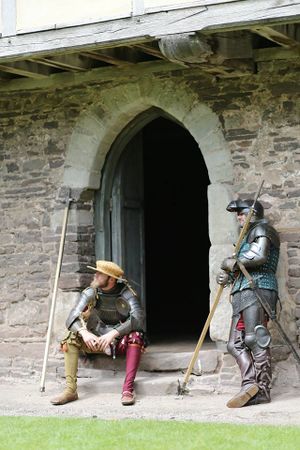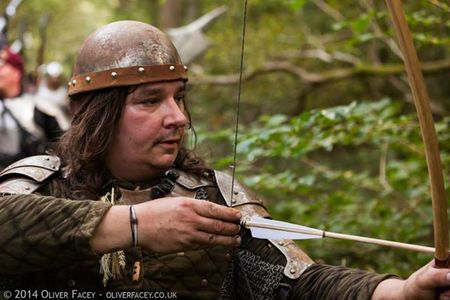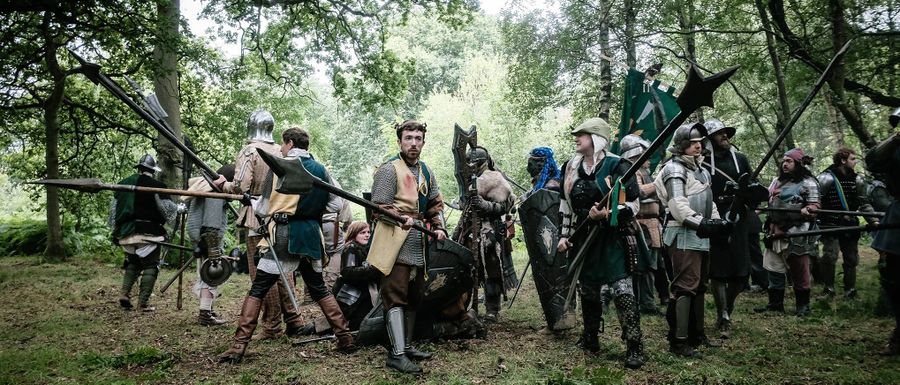The Marches military concerns
mNo edit summary |
m (→Overview: degendering) |
||
| (60 intermediate revisions by 7 users not shown) | |||
| Line 1: | Line 1: | ||
{{CaptionedImage|file=YeomenBreak.jpg|align=right|caption=Hard work wins wars.|title=War is not won in a moment|width=300}} | |||
{{CaptionedImage|file=YeomenBreak.jpg|align=right|caption=Hard work wins wars.|title=War is not won in a | ==Overview== | ||
The rich Marcher soil gives rise to great military strength and | The rich Marcher soil gives rise to great military strength and, after the recent recruitment of The Tusks, four of the Empire's armies come from the Marches. Marcher generals have a reputation for being cautious, and for valuing victory more than personal glory. War is seen as work, hard dirty work, something to achieve over months of effort, not something to be won or lost in a moment. It is also seen as a shared responsibility, something that everyone who can must face together. On campaign, even Marcher generals who can't fight for whatever reason are expected to share the same risks and privations as the common soldier, one yeoman amongst many. | ||
Powerful [[Marcher Household|households]] field ranks of heavily-armoured yeomen wearing their colours and fighting together. Neighbours well-used to working together fight shoulder to shoulder. The expectation of loyalty and sacrifice can make a Marcher household a fearsomely cohesive force. Traditional rivalries are put to one side when a Marcher army faces a force of outsiders, and folk who would go out of their way to avoid acknowledging each other will fight back to back against a band of invading orcs. | Powerful [[Marcher Household|households]] field ranks of heavily-armoured yeomen wearing their colours and fighting together. Neighbours well-used to working together fight shoulder to shoulder. The expectation of loyalty and sacrifice can make a Marcher household a fearsomely cohesive force. Traditional rivalries are put to one side when a Marcher army faces a force of outsiders, and folk who would go out of their way to avoid acknowledging each other will fight back to back against a band of invading orcs. | ||
The strength of the Marcher forces is derived from their long hours of toil. Arms hardened by days at the forge, cutting a forest, or threshing grain are strong enough for any fight. It is common for Marchers to wield weapons made from the tools of their labour; bills used for cutting hedges and great hammers used for driving piles are pressed into service of war. The wealthiest may march in a harness of plate but plenty have nothing more than a hard leather tunic or quilted jack they have made themselves. Their true strength is their loyalty and discipline; at their best a Marcher army is a great hedge of steel, moving inexorably forward like a harvest-gang through a field of wheat. | The strength of the Marcher forces is derived from their long hours of toil. Arms hardened by days at the forge, cutting a forest, or threshing grain are strong enough for any fight. It is common for Marchers to wield weapons made from the tools of their labour; bills used for cutting hedges and great hammers used for driving piles are pressed into service of war. The wealthiest may march in a harness of plate but plenty have nothing more than a hard leather tunic or quilted jack they have made themselves. Their true strength is their loyalty and discipline; at their best a Marcher army is a great hedge of steel, moving inexorably forward like a harvest-gang through a field of wheat. | ||
__TOC__ | |||
Service to the Empire in one of the Marcher armies is considered an excellent coming of age for the children of a yeoman. This offers them a chance to learn a little of the outside world and to earn enough to purchase their own farm and become yeomen themselves. For a nation that prides itself on its military prowess, it also ensures a steady stream of soldiers with practical experience of battle. | |||
{{CaptionedImage|file=MarcherArcher.jpg|align=left|caption=Beaters watch for thieves, vagrants, and other ne'er-do-wells.|title="Green"Jack Woodruff of Upwold, yeoman of the Applewood Levy. Some say he shot sixteen orcs in the battle; some say he shot fifteen.|width=450}} | |||
== Beaters == | == Beaters == | ||
Beaters roam through the Marches, learning every part of the land, watching for thieves, vagrants and other ne’er-do-wells. Beaters are often instrumental in settling land disputes between neighbours and they still play a vital role in the tradition of [[The Marches culture and customs#The beating of the bounds|beating the bounds]]. Beaters often live off the land and most are skilled | Beaters roam through the Marches, learning every part of the land, watching for thieves, vagrants and other ne’er-do-wells. Beaters are often instrumental in settling land disputes between neighbours and they still play a vital role in the tradition of [[The Marches culture and customs#The beating of the bounds|beating the bounds]]. Beaters often live off the land and most are skilled rangers or hunters. They serve as an informal police force, investigating crimes and tracking criminals. While an individual beater often associates with one or more households, they make no secret of the fact that they maintain an informal network among themselves. | ||
The beaters watch the boundaries and defend them against trespass until its forces can muster. They also remain vigilant for internal threats. In addition to the orcs that still occupy the more inaccessible hills and wild forests of the Marches, there are bands of Féni, the ancient people driven from the fertile lowlands centuries ago. These primitive humans cover their skin in green and yellow tattoos and launch raids against civilised Marchers to steal cattle or crops. If something or someone is raiding out of the forests or hills then the beaters are the ones who are called on to hunt it. | The beaters watch the boundaries and defend them against trespass until its forces can muster. They also remain vigilant for internal threats. In addition to the orcs that still occupy the more inaccessible hills and wild forests of the Marches, there are bands of Féni, the ancient people driven from the fertile lowlands centuries ago. These primitive humans cover their skin in green and yellow tattoos and launch raids against civilised Marchers to steal cattle or crops. If something or someone is raiding out of the forests or hills then the beaters are the ones who are called on to hunt it. | ||
| Line 17: | Line 18: | ||
==Imperial Armies== | ==Imperial Armies== | ||
The Marches field | The Marches field four [[imperial armies]]; the ''Drakes'', the ''Strong Reeds'', the ''Bounders'' and ''The Tusks''. There has been some upheaval in the nature of the Marcher armies in recent years, following a [[Bills_or_bows|careful examination of Marcher values]] in the wake of the liberation of the [[Mournwold]]. | ||
{{CaptionedImage|file=Drakes.jpg|align=left|width=100}} | {{CaptionedImage|file=Drakes.jpg|align=left|width=100}} | ||
===The Drakes=== | ===The Drakes=== | ||
First | First led by the legendary Tom Drake, this army is [[Army qualities#Resourceful|extremely well-supplied]] and has an excellent corps of quartermasters, allowing it to recover casualties much more swiftly than normal. Many of the soldiers in this army come from [[Mitwold]], and this has led to a reputation for dogged determination and occasional internal conflict away from the battlefield. Its ranks have been swelled in recent years with soldiers displaced from the [[Mournwold]], which has helped exacerbate the situation. As of the [[Enlargement_of_the_Drakes|Winter Solstice 382YE]], the [[Drakes]] have been [[Bills_or_bows#The_Drakes|relying on the support of their people]] to make the most of these raw recruits, and are in the process of being [[Imperial_army#Enlargement|enlarged]]. | ||
The first Marcher General leads the Drakes army, and is appointed (or re-appointed) at the Summer solstice each year. | The first Marcher General leads the Drakes army, and is appointed (or re-appointed) at the Summer solstice each year. | ||
{{CaptionedImage|file=StrongReeds.jpg|align=right|width=100}} | {{CaptionedImage|file=StrongReeds.jpg|align=right|width=100}} | ||
===The Strong Reeds=== | ===The Strong Reeds=== | ||
Initially raised from the people of [[Bregasland]], there is still a strong territorial bias in the soldiers of this army. | Initially raised from the people of [[Bregasland]], there is still a strong territorial bias in the soldiers of this army. The [[Strong Reeds]] is notorious for the dour, stubborn nature of the soldiers who serve under its banner. The Strong Reeds have a long history of resisting [[Jotun]] aggression against the marshes, and have several times in their history fought alongside the [[Wintermark]] armies in [[Kallavesa]]. In recent years they have embraced much older, [[Army qualities#Secretive|secretive stratagems]], relying on skills honed by years in the fens to perfect the art of scattering into a territory and lay low in appropriate [[territory]]. | ||
The second Marcher General leads the Strong Reeds army, and is appointed (or re-appointed) at the Winter solstice each year. | The second Marcher General leads the Strong Reeds army, and is appointed (or re-appointed) at the Winter solstice each year. | ||
{{CaptionedImage|file=TheBounders.jpg|align=left|width=100}} | {{CaptionedImage|file=TheBounders.jpg|align=left|width=100}} | ||
===Bounders=== | ===Bounders=== | ||
This adaptable army attracts many [[The Marches military concerns#Beaters|beaters]] who support a solid core of [[Upwold]] soldiers and a small cadre of dedicated battlefield magicians. They are skilled skirmish fighters, able to quickly learn the lay of the land and [[ | This adaptable army attracts many [[The Marches military concerns#Beaters|beaters]] who support a solid core of [[Upwold]] soldiers and a small cadre of dedicated battlefield magicians. They are skilled skirmish fighters, able to quickly learn the lay of the land and [[Army qualities#Relentless|relentless in their pursuit]] of their enemies. Some of the best military archers in the Empire are part of the [[Bounders]] adept at bringing down their opponents with a combination of clever placement and withering storms of arrows. They are also adept scouts and trackers - unsurprising perhaps given the number of [[#Beaters|beaters]] who serve or have served under their banner. Since the Spring of 383YE, they have focused their efforts on [[Army qualities#Watchful|guarding the borders]] of the Empire. | ||
The third Marcher General leads the Bounders army, and is appointed (or re-appointed) at the Autumn equinox each year. | The third Marcher General leads the Bounders army, and is appointed (or re-appointed) at the Autumn equinox each year. | ||
{{CaptionedImage|file=Tusks.jpg|align=right|width=100}} | |||
===The Tusks=== | |||
The fourth Marcher Army was raised by [[Raise_Marcher_Army|Senate motion]] proposed by Henry Ward, then Senator for Upwold, during the Winter Solstice of 377YE. Mustering completed shortly before the Summer Solstice 378YE. The army of The [[Tusks]] was briefly named after [[Mournwold#Green_March|High Courage]], an ancient monument in Mournwold. This highly [[Army qualities#Disciplined|disciplined]] force saw its first major engagement when the Empire [[379YE_Winter_Solstice_winds_of_war#The_Mourning_Wind|launched its liberation of the Mourn]] in late Autumn 379YE. | |||
The Marcher officer walked out into the middle of the gathered mob, slow and casual, thumbs tucked into his belt. He took a long look around. | The fourth Marcher General leads the army of The Tusks, and was initially appointed at the Summer Solstice each year. starting in 384YE, however, the election will be shifted to the Spring Equinox following [[Bills_or_bows#Resolution|the consideration of the Civil Service]]. | ||
<div style="float:right; width: 450px; clear: right;"><quote by="Marcher Traditional">War is a thrice-ploughed field.</quote></div> | |||
==Army Orders== | |||
Unlike other generals, the leaders of the Marcher armies are slightly restricted in the [[Army orders|orders]] they can give to their troops. Following the [[All_along_the_watchtower#Resolution|events of the Summer Solstice 381YE]], no Marcher general can issue an order to [[Army orders#Give Ground|give ground]]. If they try to do so, it will default to [[#Solid Defence|solid defence]]. | |||
However, as a result of a [[mandate]] enacted by Friar John of the Mourn during the Autumn Equinox 382YE, any Marcher army can now issue the defensive order to fight ''shoulder to shoulder''. | |||
<box>'''Shoulder to Shoulder''' | |||
* '''The ability of this army to defend territory is increased by a fifth.''' | |||
* '''For each additional Marcher army beyond the first that stands shoulder to shoulder to defend the territory, casualties suffered by all those armies and casualties inflicted by all those armies decreases by one tenth.''' | |||
A general who gives the order to fight shoulder to shoulder relies on the legendary Marcher bill blocks to hold the enemy at bay, while units of archers loose arrows on any that come too close. The goal is not to spill blood, but simply to keep the enemy at bay for as long as possible. By fighting in disciplined ranks, the Marcher army can form an impregnable line that is difficult for any enemy to breach.</box> | |||
{{CaptionedImage|align=centre|file=Entrenche.jpg|width=900}} | |||
<ic>The Marcher officer walked out into the middle of the gathered mob, slow and casual, thumbs tucked into his belt. He took a long look around. | |||
“Who here’s got a neighbour they can’t stand?” | “Who here’s got a neighbour they can’t stand?” | ||
| Line 65: | Line 82: | ||
</ic> | </ic> | ||
{{The Marches Links}} | |||
[[Category:The Marches]] | [[Category:The Marches]] | ||
[[Category: | [[Category:Archetype]] | ||
Revision as of 14:22, 20 April 2024
Overview
The rich Marcher soil gives rise to great military strength and, after the recent recruitment of The Tusks, four of the Empire's armies come from the Marches. Marcher generals have a reputation for being cautious, and for valuing victory more than personal glory. War is seen as work, hard dirty work, something to achieve over months of effort, not something to be won or lost in a moment. It is also seen as a shared responsibility, something that everyone who can must face together. On campaign, even Marcher generals who can't fight for whatever reason are expected to share the same risks and privations as the common soldier, one yeoman amongst many.
Powerful households field ranks of heavily-armoured yeomen wearing their colours and fighting together. Neighbours well-used to working together fight shoulder to shoulder. The expectation of loyalty and sacrifice can make a Marcher household a fearsomely cohesive force. Traditional rivalries are put to one side when a Marcher army faces a force of outsiders, and folk who would go out of their way to avoid acknowledging each other will fight back to back against a band of invading orcs.
The strength of the Marcher forces is derived from their long hours of toil. Arms hardened by days at the forge, cutting a forest, or threshing grain are strong enough for any fight. It is common for Marchers to wield weapons made from the tools of their labour; bills used for cutting hedges and great hammers used for driving piles are pressed into service of war. The wealthiest may march in a harness of plate but plenty have nothing more than a hard leather tunic or quilted jack they have made themselves. Their true strength is their loyalty and discipline; at their best a Marcher army is a great hedge of steel, moving inexorably forward like a harvest-gang through a field of wheat.
Service to the Empire in one of the Marcher armies is considered an excellent coming of age for the children of a yeoman. This offers them a chance to learn a little of the outside world and to earn enough to purchase their own farm and become yeomen themselves. For a nation that prides itself on its military prowess, it also ensures a steady stream of soldiers with practical experience of battle.
Beaters
Beaters roam through the Marches, learning every part of the land, watching for thieves, vagrants and other ne’er-do-wells. Beaters are often instrumental in settling land disputes between neighbours and they still play a vital role in the tradition of beating the bounds. Beaters often live off the land and most are skilled rangers or hunters. They serve as an informal police force, investigating crimes and tracking criminals. While an individual beater often associates with one or more households, they make no secret of the fact that they maintain an informal network among themselves.
The beaters watch the boundaries and defend them against trespass until its forces can muster. They also remain vigilant for internal threats. In addition to the orcs that still occupy the more inaccessible hills and wild forests of the Marches, there are bands of Féni, the ancient people driven from the fertile lowlands centuries ago. These primitive humans cover their skin in green and yellow tattoos and launch raids against civilised Marchers to steal cattle or crops. If something or someone is raiding out of the forests or hills then the beaters are the ones who are called on to hunt it.
In time of war, beaters serve the Marches as scouts, ranging ahead of the main force. Their experience watching the boundaries of the nation makes them useful light troops, particularly in forested areas, an excellent complement to the heavily armoured yeomen.
Imperial Armies
The Marches field four imperial armies; the Drakes, the Strong Reeds, the Bounders and The Tusks. There has been some upheaval in the nature of the Marcher armies in recent years, following a careful examination of Marcher values in the wake of the liberation of the Mournwold.
The Drakes
First led by the legendary Tom Drake, this army is extremely well-supplied and has an excellent corps of quartermasters, allowing it to recover casualties much more swiftly than normal. Many of the soldiers in this army come from Mitwold, and this has led to a reputation for dogged determination and occasional internal conflict away from the battlefield. Its ranks have been swelled in recent years with soldiers displaced from the Mournwold, which has helped exacerbate the situation. As of the Winter Solstice 382YE, the Drakes have been relying on the support of their people to make the most of these raw recruits, and are in the process of being enlarged.
The first Marcher General leads the Drakes army, and is appointed (or re-appointed) at the Summer solstice each year.
The Strong Reeds
Initially raised from the people of Bregasland, there is still a strong territorial bias in the soldiers of this army. The Strong Reeds is notorious for the dour, stubborn nature of the soldiers who serve under its banner. The Strong Reeds have a long history of resisting Jotun aggression against the marshes, and have several times in their history fought alongside the Wintermark armies in Kallavesa. In recent years they have embraced much older, secretive stratagems, relying on skills honed by years in the fens to perfect the art of scattering into a territory and lay low in appropriate territory.
The second Marcher General leads the Strong Reeds army, and is appointed (or re-appointed) at the Winter solstice each year.
Bounders
This adaptable army attracts many beaters who support a solid core of Upwold soldiers and a small cadre of dedicated battlefield magicians. They are skilled skirmish fighters, able to quickly learn the lay of the land and relentless in their pursuit of their enemies. Some of the best military archers in the Empire are part of the Bounders adept at bringing down their opponents with a combination of clever placement and withering storms of arrows. They are also adept scouts and trackers - unsurprising perhaps given the number of beaters who serve or have served under their banner. Since the Spring of 383YE, they have focused their efforts on guarding the borders of the Empire.
The third Marcher General leads the Bounders army, and is appointed (or re-appointed) at the Autumn equinox each year.
The Tusks
The fourth Marcher Army was raised by Senate motion proposed by Henry Ward, then Senator for Upwold, during the Winter Solstice of 377YE. Mustering completed shortly before the Summer Solstice 378YE. The army of The Tusks was briefly named after High Courage, an ancient monument in Mournwold. This highly disciplined force saw its first major engagement when the Empire launched its liberation of the Mourn in late Autumn 379YE.
The fourth Marcher General leads the army of The Tusks, and was initially appointed at the Summer Solstice each year. starting in 384YE, however, the election will be shifted to the Spring Equinox following the consideration of the Civil Service.
War is a thrice-ploughed field.
Marcher TraditionalArmy Orders
Unlike other generals, the leaders of the Marcher armies are slightly restricted in the orders they can give to their troops. Following the events of the Summer Solstice 381YE, no Marcher general can issue an order to give ground. If they try to do so, it will default to solid defence.
However, as a result of a mandate enacted by Friar John of the Mourn during the Autumn Equinox 382YE, any Marcher army can now issue the defensive order to fight shoulder to shoulder.
- The ability of this army to defend territory is increased by a fifth.
- For each additional Marcher army beyond the first that stands shoulder to shoulder to defend the territory, casualties suffered by all those armies and casualties inflicted by all those armies decreases by one tenth.
“Who here’s got a neighbour they can’t stand?”
The circle of Marchers looked tentatively one to another, a few raised hands and chuckles.
“Quite a few of you, I see. So let me ask you this – raiders come to burn their farm, would you go help them?”
Nods, fist shaking, raised bills and bows.
“Course you would, only common sense; they burn that farm this week, could be yours the week after, couldn’t it?”
He pointed at the gaudily dressed Free Company officers swaggering about in the League lines on their flank.
“See them? I don’t like ‘em. I don’t like their plumes, I don’t like them silly pantaloons, I don’t like the perfumed piss they call wine, or the way they put on airs when they talk, or their grub what’s so full of spices it gives me the gallopin’ trots. Nope, I don’t like ‘em, not one bit. But, them? They’re our neighbours.”
He pointed to the other end of the valley, where thousands of grey-skinned orcs covered the ground like blades of grass on a pasture.
“And those motherless bastards? They’re going to try and burn down our neighbour’s barn.”
Rumbling growl, stamping feet, billhooks banged on the ground.
“We proposin’ to let em?”
Full throated roar, weapons brandished, rising chant.
“Right then, let’s go pull the idiot neighbour’s arse out of the fire, eh?”
Further Reading
Core Brief
Additional Information






